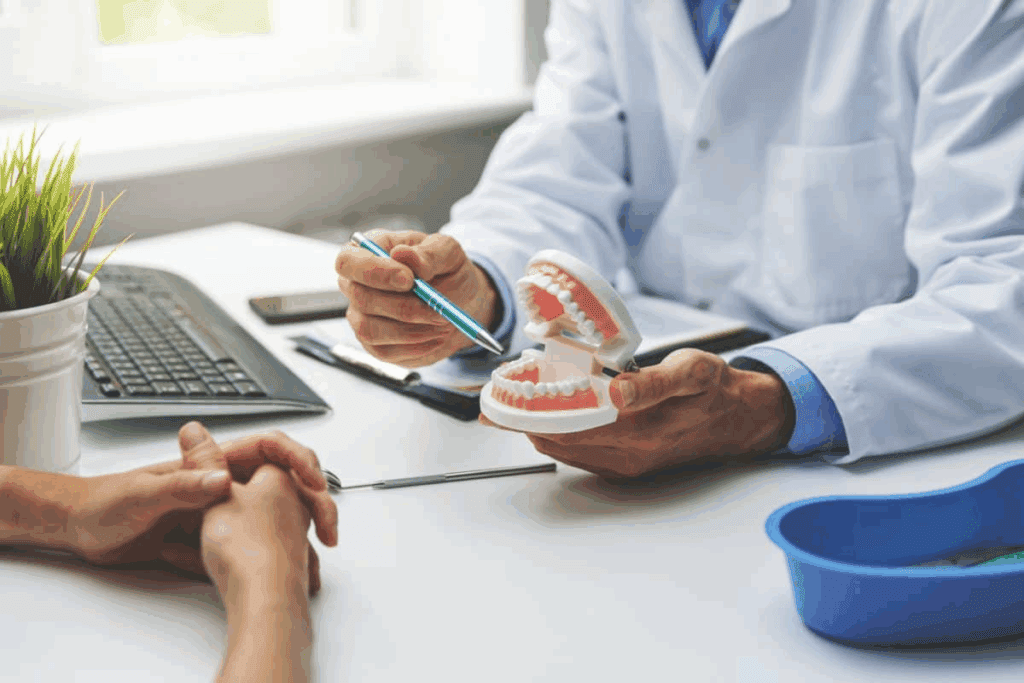
Arthritis can affect many parts of your life, including your teeth. This is true for both osteoarthritis and rheumatoid arthritis (RA). Studies show a strong connection between RA and problems with your teeth.
Rheumatoid arthritis is a chronic autoimmune condition that primarily affects joints but also impacts oral health. Rheumatoid arthritis and teeth are linked, as the condition can affect your dental health as well.
Key Takeaways
- RA can affect your oral health.
- There’s a link between RA and dental health issues.
- Understanding this connection is key to keeping your mouth healthy.
- Proper care can manage oral health problems linked to RA.
- Regular dental visits are vital for people with RA.
Understanding Rheumatoid Arthritis
Rheumatoid arthritis is an autoimmune disorder that affects more than just joint pain. It happens when the body’s immune system attacks the lining of the joints. This leads to inflammation and pain.
What is Rheumatoid Arthritis?
Rheumatoid arthritis (RA) is a chronic inflammatory disorder that mainly affects joints. It can also harm other tissues and organs in the body.
Autoimmune Nature of RA
The autoimmune aspect of RA means the body’s immune system attacks healthy tissue. This causes inflammation and damage. If not managed well, it can lead to severe pain and deformity.
Common Symptoms and Manifestations
Common symptoms include joint pain, stiffness, and swelling. These symptoms often affect the same joints on both sides of the body.
How RA Differs from Osteoarthritis
Unlike osteoarthritis, a degenerative joint disease, RA involves the immune system. It can affect multiple joints at once. This is important for choosing the right treatment.
Systemic Effects of Rheumatoid Arthritis
RA is not just a joint condition; it affects the whole body. It can impact other parts, including the mouth. Research shows a link between RA and gum disease. This means rheumatoid arthritis and gum disease are connected. The question of can rheumatoid arthritis affect your teeth is important, as it can cause dental problems.
| Aspect | Rheumatoid Arthritis (RA) | Osteoarthritis (OA) |
| Nature | Autoimmune | Degenerative |
| Joint Impact | Multiple joints, symmetric | Typically single joint, not necessarily symmetric |
| Systemic Effects | Yes, including oral health impacts | No systemic effects |
Experts say, “RA is an autoimmune disorder with strong ties to oral bacteria. This means RA might affect your dental health, and poor oral health might worsen RA.” This shows the connection between RA and oral health.
Rheumatoid Arthritis and Teeth: The Direct Connection
The link between rheumatoid arthritis (RA) and oral health is clear. Studies show RA’s big impact on teeth and gums.
How Inflammatory Conditions Affect Oral Health

RA’s inflammation can harm oral health. Research links RA to more dental problems, like gum disease and tooth loss. This is because RA’s inflammation makes oral health issues worse.
The Autoimmune Component in Dental Issues
RA’s autoimmune part makes oral health harder. Studies say the same autoimmunity that hurts joints can also harm gums and teeth.
Research Evidence on Dental Manifestations
Many studies have looked into RA and dental health.
- Clinical studies show RA patients get periodontal disease more often.
- Patients with RA find it hard to keep their teeth clean because of hand issues and jaw pain.
Clinical Studies
Clinical studies have given us important info on RA and oral health. For example, severe RA patients often have severe gum disease.
Patient Experiences
RA patients struggle with oral hygiene because of joint pain and limited dexterity. This makes them more likely to have dental problems, which can make RA symptoms worse.
| Study | Findings |
| Study on RA and Periodontitis | Patients with RA have a higher prevalence of periodontitis. |
| Research on RA and Dental Health | RA patients are more likely to experience tooth loss. |
Common Dental Problems in People with Rheumatoid Arthritis

People with RA often face dental issues because of the disease’s effects and treatment side effects. The connection between RA and oral health is complex. It involves many factors that can harm dental health.
Tooth Loss and Decay Patterns
RA patients are more likely to lose teeth and get cavities. This is due to dry mouth and trouble keeping teeth clean. Research has shown that RA patients have more dental problems than others.
Dry Mouth (Xerostomia)
Dry mouth, or xerostomia, is common in RA patients. It often comes from medications used to treat the disease. Certain anti-inflammatory drugs can lower saliva, which helps keep the mouth clean.
Causes of Dry Mouth in RA Patients
There are many reasons for dry mouth in RA patients. These include:
- Medications like DMARDs and biologics
- Autoimmune damage to salivary glands
- Systemic inflammation
Managing Xerostomia
To manage dry mouth, good oral care, saliva substitutes, and dental visits are key. Patients are advised to drink water often, chew sugar-free gum, and avoid sugary or acidic foods.
Difficulty with Oral Hygiene Due to Joint Pain
Joint pain and stiffness from RA make oral care hard. Adaptive tools and special oral care methods can help.
RA patients can improve their oral health by understanding these common problems. This helps maintain their overall well-being.
Rheumatoid Arthritis and Gum Disease
It’s important to understand how rheumatoid arthritis (RA) and gum disease are connected. Studies show that people with RA are more likely to get periodontitis. This is a serious gum disease.
The Bidirectional Relationship Between RA and Periodontitis
RA and gum disease affect each other. Inflammation from RA can make gum disease worse. Also, gum disease can make RA symptoms worse.
Shared Inflammatory Pathways
Both RA and gum disease involve chronic inflammation. They share the same inflammatory pathways. Certain cytokines and inflammatory mediators are found in both conditions. This shows how oral health is linked to systemic health.
Impact of Periodontitis on RA Severity
Periodontitis can make RA symptoms worse. Treating gum disease may help reduce RA symptoms. This shows how important oral health is for managing RA.
How Treating Gum Disease May Affect RA Symptoms
Treating periodontitis can help reduce RA symptoms. This is because it lowers systemic inflammation. Treating the oral infection helps overall health.
Preventive Approaches
Preventing gum disease is key for people with RA. Regular dental visits, good oral hygiene, and anti-inflammatory treatments can help. These steps can prevent gum disease and reduce RA symptoms.
| Preventive Measure | Description | Benefit |
| Regular Dental Check-ups | Frequent visits to the dentist for professional cleaning and monitoring. | Early detection and treatment of gum disease. |
| Proper Oral Hygiene | Brushing and flossing regularly to remove plaque and bacteria. | Prevention of periodontitis and reduction in RA symptoms. |
| Anti-inflammatory Treatments | Use of medications that reduce inflammation. | Potential reduction in both RA and periodontitis severity. |
Can Rheumatoid Arthritis Affect Your Jaw?
RA can affect more than just the usual joints. It might also impact the temporomandibular joint (TMJ). This joint is key for jaw movement, helping us chew and speak. Inflammation here can cause pain, stiffness, and trouble opening or closing the mouth.
Temporomandibular Joint (TMJ) Involvement
The TMJ is a complex joint that RA can affect. This leads to various symptoms. Studies show RA patients often face TMJ issues.
Prevalence of TMJ Issues in RA Patients
Research shows TMJ problems are common in RA patients. Symptoms range from mild discomfort to severe pain and limited jaw mobility.
Structural Changes in the Jaw
RA can cause changes in the jaw’s structure. This includes erosion of the joint and surrounding bone. Such changes can lead to chronic pain and make everyday tasks hard.
Symptoms of RA-Related Jaw Problems
Symptoms of RA-related jaw problems include:
- Pain or tenderness in the jaw
- Difficulty chewing or opening the mouth wide
- Clicking or grating sounds when moving the jaw
- Locking of the jaw
Diagnosis and Assessment Methods
Diagnosing RA-related jaw problems involves several steps. These include a clinical exam, patient history, and imaging studies like X-rays or MRI. Early diagnosis is key for effective management.
Medication Effects on Dental Health
Managing Rheumatoid Arthritis often involves a complex regimen of medications. These can have significant effects on dental health. It’s important to understand these effects to maintain good oral hygiene and prevent dental complications.
DMARDs and Oral Side Effects
Disease-Modifying Antirheumatic Drugs (DMARDs) are a common treatment for RA. They are effective but can cause oral side effects. These include mouth ulcers and dry mouth (xerostomia), which can increase the risk of tooth decay and gum disease.
Biologics and Dental Considerations
Biologic treatments target specific parts of the immune system. They can be effective but may increase the risk of infections. This includes infections in the oral cavity. Regular dental check-ups are essential for patients on biologic therapy.
Corticosteroids and Oral Health
Corticosteroids are used to reduce inflammation and pain in RA patients. They can have oral health implications, including:
Increased Infection Risk
Corticosteroids can suppress the immune system. This makes patients more susceptible to infections, including oral infections.
Impact on Bone Density in the Jaw
Long-term use of corticosteroids can affect bone density. This can potentially lead to osteoporosis in the jaw. This can complicate dental procedures like extractions.
| Medication Type | Oral Health Impact | Precautions |
| DMARDs | Mouth ulcers, dry mouth | Regular oral hygiene, dental check-ups |
| Biologics | Increased infection risk | Monitor for signs of infection, regular dental visits |
| Corticosteroids | Increased infection risk, impact on jaw bone density | Maintain good oral hygiene, consider bone density monitoring |
Pain Medications and Dental Implications
Pain medications, including NSAIDs, are commonly used to manage RA symptoms. While generally safe, long-term use can have dental implications. These include an increased risk of gum disease. Patients should be aware of these risks and discuss them with their healthcare provider.
Challenges in Dental Care for RA Patients
Rheumatoid arthritis (RA) patients face special challenges in dental care. The condition makes it hard to do everyday oral hygiene tasks because of hand and finger issues.
Physical Limitations Affecting Oral Hygiene
RA can make it tough to take care of your teeth. The pain and stiffness in your hands and fingers make it hard to hold a toothbrush or floss.
Grip Difficulties
Many RA patients struggle with grip issues. Adaptive tools with bigger handles can help hold toothbrushes and other dental tools better.
Range of Motion Issues
Having less range of motion can also be a problem. Patients might need to adjust their brushing technique or use tools with longer handles to clean their mouth fully.
Accessibility Issues in Dental Care
Getting to dental care can be hard too. RA patients need to find dental clinics that are accessible for people with mobility issues. It’s important for dental care providers to understand the patient’s condition and its effects.
Pain Management During Dental Procedures
Managing pain during dental visits is key. As one study pointed out, “Pain management is a critical aspect of dental care for RA patients, requiring careful consideration of their overall health and medication regimen.”
Preventive Dental Strategies for People with RA
Rheumatoid Arthritis (RA) can really hurt your teeth and gums. People with RA often get tooth decay, gum disease, and TMJ problems. It’s important to take special steps to keep your mouth healthy.
Modified Oral Hygiene Techniques
Changing how you brush and floss can help with dental health. Electric toothbrushes are great because they need less effort from your hands.
Adaptive Toothbrushes and Tools
Electric toothbrushes are a good choice for RA patients. They make brushing easier. Look for toothbrushes with big handles or grips that fit your hand better.
Simplified Flossing Methods
Flossing can be hard for RA patients because of hand problems. Try using floss holders or interdental brushes. They make flossing easier and keep your gums healthy.
Recommended Dental Products
Choosing the right dental products is key. Look for ones that are gentle and have fluoride to prevent cavities. Alcohol-free mouthwashes help avoid dry mouth.
Frequency of Dental Check-ups
Going to the dentist regularly is very important. People with RA should see their dentist at least twice a year. Or, as often as your doctor suggests.
Dietary Considerations for Dental Health with RA
Eating a diet full of calcium and vitamin D helps keep your teeth and bones strong. Try to eat less sugary and acidic foods. This can help prevent tooth decay and erosion.
By following these tips, people with RA can take care of their teeth and gums. This can help avoid dental problems linked to RA.
When to Consult Healthcare Professionals
People with rheumatoid arthritis need to know when to see a dentist. Regular dental visits help catch oral health problems early.
Signs That Require Dental Attention
RA patients should look out for signs like increased tooth sensitivity, gum recession, or persistent bad breath. These could mean dental issues. If you notice these symptoms, see a dentist right away.
Coordinating Care Between Dentist and Rheumatologist
It’s important for your dentist and rheumatologist to work together. This teamwork ensures your health is fully considered during treatment.
Information Sharing Between Specialists
Your dentist and rheumatologist should share your medical history. This includes any medications you’re taking. This sharing helps make better care decisions.
Medication Considerations Before Dental Procedures
Some RA treatments, like DMARDs or biologics, can affect dental care. Tell your dentist about your medications to avoid problems.
Emergency Dental Situations for RA Patients
If you have a dental emergency, like a severe toothache or trauma, get help fast. Having a plan for emergencies can help prevent bigger issues.
| Dental Issue | RA Related Concerns | Action Required |
| Gum Disease | Increased risk due to RA | Regular dental check-ups |
| Dry Mouth | Medication side effect | Use saliva substitutes |
| Tooth Loss | Advanced periodontitis | Dental implants or dentures |
Latest Research on Rheumatoid Arthritis and Oral Health
Recent studies have greatly improved our understanding of rheumatoid arthritis and oral health. They show a strong connection between these two conditions. This research has given us new insights into how they are linked.
New Findings on the RA-Periodontitis Link
Research has found a strong link between periodontitis and rheumatoid arthritis. It suggests that bacteria from periodontitis might trigger or worsen RA. This highlights the key role of oral health in managing RA.
Emerging Treatments and Approaches
New treatments for RA are looking at the oral health connection. Research into anti-inflammatory and antimicrobial treatments is promising. These aim to manage RA symptoms and address the underlying causes, including oral health issues.
Future Directions in Research
Future research will explore the microbiome’s role in RA and develop targeted therapies. Understanding the microbiome’s impact could lead to new treatments. These would consider both systemic and oral health aspects of the disease.
Microbiome Studies
Microbiome studies are key to understanding how oral microbiota changes affect RA. This research could find new therapy targets. It might lead to better RA management through oral microbiome modulation.
Targeted Therapies
Targeted therapies are a promising area for RA treatment. They focus on specific disease pathways. Researchers aim to create treatments that are more effective and have fewer side effects. This could greatly improve RA patients’ quality of life.
Conclusion
Rheumatoid arthritis can really hurt your dental health. It affects your teeth, gums, and overall mouth health. It’s important to know how RA and oral health are connected.
People with RA are more likely to face dental problems. These can include losing teeth, dry mouth, and gum disease. The inflammation from RA can make these issues worse. So, it’s key to see a dentist regularly.
To protect your teeth, people with RA should use special oral hygiene methods. They should also work closely with their healthcare team. Does rheumatoid arthritis affect your teeth? Yes, it can, but knowing this can help you take care of your mouth and body.
Keeping up with the latest research on RA and oral health is also important. This way, people with RA can make better choices for their care. By teaming up with their healthcare team, they can keep their mouth healthy and manage their RA well.
FAQ
Can rheumatoid arthritis affect your teeth?
Yes, rheumatoid arthritis (RA) can harm your teeth. Its inflammation and autoimmune nature can cause tooth loss and decay.
How does rheumatoid arthritis impact oral health?
RA can harm your oral health by raising the risk of gum disease and tooth decay. It can also cause dry mouth. The condition’s effects and treatments can lead to more oral health issues.
Is there a link between rheumatoid arthritis and gum disease?
Yes, there’s a link between RA and gum disease. Both conditions can make each other worse. They share inflammatory pathways, making both diseases more severe.
Can RA medications affect dental health?
Yes, RA medications can harm your dental health. They can cause dry mouth, increase infection risk, and affect jaw bone density.
How can individuals with RA maintain good oral hygiene?
People with RA can keep their teeth clean by using special toothbrushes and simple flossing. Regular dental visits are also key.
Can rheumatoid arthritis affect the temporomandibular joint (TMJ)?
Yes, RA can hurt the TMJ. This can cause jaw pain, stiffness, and trouble chewing or opening the mouth wide.
What are the challenges in dental care for RA patients?
RA patients face dental care challenges. These include physical limitations, dental access issues, and pain during dental visits.
How often should individuals with RA have dental check-ups?
RA patients should see their dentist regularly. The dentist will decide how often based on their oral health needs.
Are there any dietary considerations for dental health with RA?
Yes, diet matters for dental health in RA patients. Avoiding sugary and acidic foods helps keep teeth healthy.
When should RA patients consult healthcare professionals about their dental health?
RA patients should see healthcare professionals for dental issues like tooth pain or gum inflammation. They should also coordinate dental and rheumatology care.
References
- Ma, K. S. K., et al. (2022). Bidirectional relationship between osteoarthritis and periodontitis. International Journal of Environmental Research and Public Health, 19(15), 9640. https://pmc.ncbi.nlm.nih.gov/articles/PMC9358960/



































